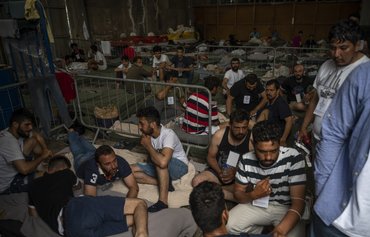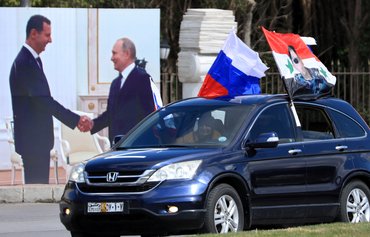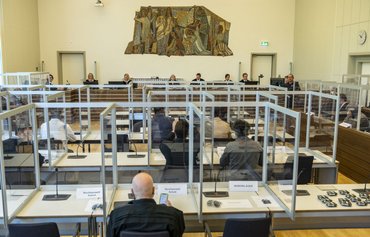BRUSSELS -- International donors pledged $6.7 billion for Syria at a conference in Brussels Tuesday (May 10), insisting the crisis had not been forgotten even as the Ukraine war grips the world's attention.
"This event today comes at a particularly difficult time," said EU neighbourhood commissioner Oliver Varhelyi.
"Our societies and economies, including the key donors are still struggling to recover from the pandemic while coping with the impact of the war in Ukraine."
The $6.7 billion pledged outstripped the $5.6 billion raised last year, with the money to go to helping Syrians and to neighbouring countries struggling with refugees -- not to the Damascus government.
![Displaced Syrian children return to their tents with boxes of food distributed by a local charity during Ramadan, at a camp for displaced people on the outskirts of the town of Dana, in Idlib province, on April 3. [Aaref Watad/AFP]](/cnmi_am/images/2022/05/11/35351-syria-children-displaced-600_384.jpg)
Displaced Syrian children return to their tents with boxes of food distributed by a local charity during Ramadan, at a camp for displaced people on the outskirts of the town of Dana, in Idlib province, on April 3. [Aaref Watad/AFP]
"Despite all the war in Europe, despite the COVID pandemic, donors are sending now a very strong signal to Syria and its region that we are ready to do even more than before," Varhelyi said.
Much of the money will go to help Syrians who have taken refuge in Jordan, Lebanon and Turkey, as well as Egypt and Iraq.
Aid organisations have warned that the hit to global agricultural supplies from the war in Ukraine could exacerbate food insecurity in Syria.
Syrian observers have also warned the Syrian people will face hunger because of the regime's ties to Russia and dependence on its wheat.
'Risk of escalation'
The UN special envoy to Syria, Geir Pedersen, said massive Syrian population displacement continues, with little progress from Damascus on meeting international demands for political reform.
"The economic crisis continues and violence continues, with constant risk of escalation -- even if there is something of a military stalemate," he said.
He added that diplomacy had been made "even more difficult than it was before" by the effects of the war in Ukraine.
EU foreign policy chief Josep Borrell ruled out a normalisation of ties with Syrian President Bashar al-Assad's government or a rebuilding programme for Syria, saying "if you go and spend money reconstructing Syria, it is going to support the Syrian regime".
The conference brought together around 70 countries and international institutions, including UN agencies. Russia, targeted by the West for its invasion of Ukraine, was not invited.
Borrell announced an extra $1.1 billion covering 2022, bringing its total to $1.65 billion -- the same as it pledged last year.
Overall the EU and its member states vowed $5 billion, or 75% of the entire total, according to Varhelyi.
$800 million from US
The US ambassador to the UN, Linda Thomas-Greenfield, said Washington was giving nearly $808 million.
"Given the focus... we have on Ukraine, I thought it was important for me to come here from New York to say that we have not forgotten the Syrian people," she said.
This funding brings the total US humanitarian assistance since the start of the Syria war to nearly $15 billion.
Thomas-Greenfield also stressed the need for Syrian authorities to provide unhindered humanitarian access to all Syrians in need and for the international community to support the provision of assistance through all avenues available, including through cross-border and cross-line assistance.
"The Syrian people continue to face innumerable atrocities, and we support justice and accountability for ongoing human rights violations and abuses," US Secretary of State Antony Blinken said in a statement.
"The systemic corruption and economic mismanagement of the al-Assad regime have further prevented the Syrian people from meeting their basic needs," he said.
The Syrian war started in 2011 and is now in its 12th year, with more than half a million people estimated to have been killed.
The forces of al-Assad, with backing from Russia and Iran, have been battling opposition groups, most of whom are now concentrated in Syria's northwest.
According to UNHCR, 5.7 million Syrians have registered as refugees, while UNICEF says 9.3 million Syrian children need aid both inside the country and in the wider region around Syria.

![Attendees pose for a picture during the 6th Brussels Conference on 'Supporting the future of Syria and the region' at the European Council in Brussels on May 10. [Kenzo Tribouillard/AFP]](/cnmi_am/images/2022/05/11/35350-syria-aid-conference-600_384.jpg)






